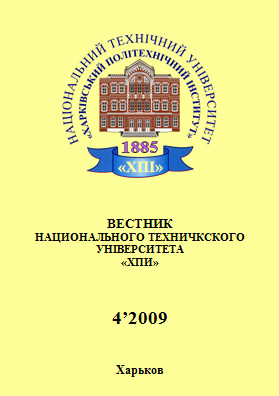Нечеткая экспертная система с регрессионным механизмом логического вывода
DOI:
https://doi.org/10.20998/%25xAbstract
Рассмотрена задача описания связи "многомерный вход - выход". Проведен анализ традиционных методов решения этой задачи. Предложена методика построения линейного по параметрам регрессионного механизма логического вывода для экспертной системы с нечеткими входными данными.The task of description of «multidimensional entrance is an output» - connection is considered. The analysis of traditional decision methods of this task is conducted. The construction method of linear on parameters regressive mechanism of inferencing is offered for a consulting model with unclear datains.
References
Дюбуа Д. Теория возможностей. Пер. с франц. / Д. Дюбуа, А. Прад. – М.: Радио и связь, 1990. - 288 с.
Леоненков А. Нечеткое моделирование в среде MATLAB и FuzzyTECH. / А. Леоненков. – СПб.: БХВ – Петербург, 2003. – 719 с.
Раскин Л.Г. Нечеткая математика. / Л.Г. Раскин, О.В. Серая. – Х.: Парус, 2008. – 353 с.
Downloads
How to Cite
Тащилин, М. В., & Каткова, Т. И. (2017). Нечеткая экспертная система с регрессионным механизмом логического вывода. Bulletin of National Technical University "KhPI". Series: System Analysis, Control and Information Technologies, (4), 69–75. https://doi.org/10.20998/%x
Issue
Section
SYSTEM ANALYSIS AND DECISION-MAKING THEORY
License
Copyright (c) 2017 Bulletin of NTU “Kharkiv Polytechnic Institute”. Series: System Analysis, Control and Information TechnologiesAuthors who publish with this journal agree to the following terms:
- Authors retain copyright and grant the journal right of first publication with the work simultaneously licensed under a Creative Commons Attribution License that allows others to share the work with an acknowledgement of the work's authorship and initial publication in this journal.
- Authors are able to enter into separate, additional contractual arrangements for the non-exclusive distribution of the journal's published version of the work (e.g., post it to an institutional repository or publish it in a book), with an acknowledgement of its initial publication in this journal.
- Authors are permitted and encouraged to post their work online (e.g., in institutional repositories or on their website) prior to and during the submission process, as it can lead to productive exchanges, as well as earlier and greater citation of published work (See The Effect of Open Access).

